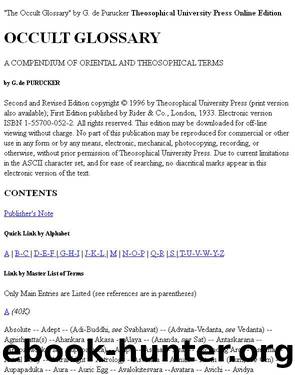The Occult Glossary; A Compendium of Oriental and Theosophical Terms by Gottfried de Purucker

Author:Gottfried de Purucker [Purucker, Gottfried de]
Language: eng
Format: epub
Published: 0101-01-01T00:00:00+00:00
Manasaputra(s)
(Sanskrit) This is a compound word: manas, "mind," putra, "son" -- "sons of mind." The teaching is that there exists a Hierarchy of Compassion, which H. P. Blavatsky sometimes called the Hierarchy of Mercy or of Pity. This is the light side of nature as contrasted with its matter side or shadow side, its night side.
It is from this Hierarchy of Compassion that came those semi-divine entities at about the middle period of the third root-race of this round, who incarnated in the semi-conscious, quasi-senseless men of that period. These advanced entities are otherwise known as the solar lhas as the Tibetans call them, the solar spirits, who were the men of a former kalpa, and who during the third root-race thus sacrificed themselves in order to give us intellectual light -- incarnating in those senseless psychophysical shells in order to awaken the divine flame of egoity and self-consciousness in the sleeping egos which we then were. They are ourselves because belonging to the same spiritray that we do; yet we, more strictly speaking, were those halfunconscious, half-awakened egos whom they touched with the divine fire of their own being. This, our "awakening," was called by H. P. Blavatsky, the incarnation of the manasaputras, or the sons of mind or light. Had that incarnation not taken place, we indeed should have continued our evolution by merely "natural" causes, but it would have been slow almost beyond comprehension, almost interminable; but that act of self-sacrifice, through their immense pity, their immense love, though, indeed, acting under karmic impulse, awakened the divine fire in our own selves, gave us light and comprehension and understanding. From that time we ourselves became "sons of the gods," the faculty of self-consciousness in us was awakened, our eyes were opened, responsibility became ours; and our feet were set then definitely upon the path, that inner path, quiet, wonderful, leading us inwards back to our spiritual home.
The manasaputras are our higher natures and, paradoxical as it is, are more largely evolved beings than we are. They were the spiritual entities who "quickened" our personal egos, which were thus evolved into self-consciousness, relatively small though that yet be. One, and yet many! As you can light an infinite number of candles from one lighted candle, so from a spark of consciousness can you quicken and enliven innumerable other consciousnesses, lying, so to speak, in sleep or latent in the life-atoms.
These manasaputras, children of mahat, are said to have quickened and enlightened in us the manas-manas of our manas septenary, because they themselves are typically manasic in their essential characteristic or svabhava. Their own essential or manasic vibrations, so to say, could cause that essence of manas in ourselves to vibrate in sympathy, much as the sounding of a musical note will cause sympathetic response in something like it, a similar note in other things. (See also Agnishvattas)
Download
This site does not store any files on its server. We only index and link to content provided by other sites. Please contact the content providers to delete copyright contents if any and email us, we'll remove relevant links or contents immediately.
The Signs Before the Day of Judgment by Unknown(659)
Explanation of the Four Principles of Shirk | Kalamullah.Com by translated by Shawana A. Aziz(647)
The Quran by Goodword(415)
What Islam Did For Us by Tim Wallace-Murphy(204)
The 200 FAQ On Muslim Beliefs. By Hafiz Ibn Ahmed Al Hakami by Unknown(195)
The Occult Glossary; A Compendium of Oriental and Theosophical Terms by Gottfried de Purucker(168)
Glow With Ramadan All Year Long! by Laila Qadira Yamini(145)
Human Being and God by Dr. Mustafa Chamran(137)
Conceiving the Goddess: Transformation and Appropriation in Indic Religions by Jayant Bhalchandra Bapat; Ian Mabbett(114)
Lessons from History: Reflections on the past, Present & Future of Two Muslim communities by Israr Ahmad(113)
Four Steps to Pure Iman: Explanations of a Painting by M. R. Bawa Muhaiyaddeen(109)
Ancient Wisdom in the Christian Scriptures by Unknown(108)
The Qur'Än: A Form-Critical History by Samji Karim(106)
Advice to Youth by Advice to Youth (b)(101)
Islam in the African-American Experience by Richard Brent Turner(90)
The social origins of Islam: mind, economy, discourse by Mohammed A. Bamyeh(86)
Book of Fear and Hope by al-Ghazali(81)
And God Knows the Soldiers: The Authoritative and Authoritarian in Islamic Discourses: The Authoritative and Authoritarian in Islamic Discourses by Khaled Abou El Fadl(76)
Religion of Islam and the Nation of Islam: What Is the Difference? by Mustafa El-Amin(70)
